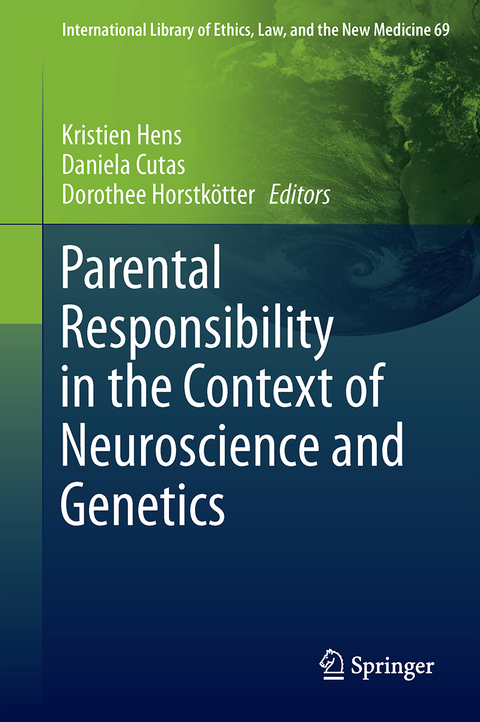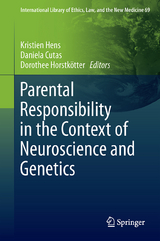Parental Responsibility in the Context of Neuroscience and Genetics
Springer International Publishing (Verlag)
978-3-319-42832-1 (ISBN)
Should parents aim to make their children as normal as possible to increase their chances to "fit in"? Are neurological and mental health conditions a part of children's identity and if so, should parents aim to remove or treat these? Should they aim to instill self-control in their children? Should prospective parents take steps to insure that, of all the children they could have, they choose the ones with the best likely start in life?
This volume explores all of these questions and more. Against the background of recent findings and expected advances in neuroscience and genetics, the extent and limits of parental responsibility are increasingly unclear. Awareness of the effects of parental choices on children's wellbeing, as well as evolving norms about the moral status of children, have further increased expectations from (prospective) parents to take up and act on their changing responsibilities.
The contributors discuss conceptual issues such as the meaning and sources of moral responsibility, normality, treatment, and identity. They also explore more practical issues such as how responsibility for children is practiced in Yoruba culture in Nigeria or how parents and health professionals in Belgium perceive the dilemmas generated by prenatal diagnosis.
Introduction.- Chapter 1: Children, neuroscience and genetics: state of the art; Prof. Dr. Frans Feron, Department of Social Medicine, Maastricht University.- Chapter 2: Pathology or condition, an exploration; Prof. Dr. Anna Bosman, Professor in Educational Science, Radboud University Nijmegen.- Chapter 3: Raising self-controlled children; Dr. Dorothee Horstkötter, Assistant Professor in the department of Health, Ethics & Society, Maastricht University.- Chapter 4: The lack of an obligation to select the best child: Silencing the principle of procreative beneficence; Dr. Peter Herissone-Kelly, Senior Lecturer in Philosophy, School of Education and Social Sciences, University of Central Lancashire.- Chapter 5: Genetic Manipulation, Assisted Reproductive Technologies and the Principle of Procreative Beneficence; Dr. Francisco Güell Pelayo, Humanities Faculty, Department of Philosophy, Universidad de Navarra.- Chapter 6: Epigenetics, neurological difference and maternal responsibility; Dr. Kristien Hens, Postdoctoral Researcher, Department of Health, Ethics & Society, Maastricht University.- Chapter 7: What (if any) are parents' responsibilities to preserve children's fertility?; Dr. Daniela Cutas, Associate Professor, Department of Historical, philosophical and religious studies, Umeå Universitet.- Chapter 8: Prenatal child protection? Pressure and coercion in prenatal care for addicted pregnant women; Dr. Wybo Dondorp, Assistant Professor, Department of Health, Ethics & Society, Maastricht University.- Chapter 9: The Ethics of Trinucleotide Repeat Expansion Disorders: Perfecting a Genetic Line to Prevent Mental Illness in Future Generations; Jennifer Chevinsky, B.S., University of Pennsylvania.- Chapter 10: Caregivers' Responsibilities and Children's Neurological Differences in Yoruba Culture: Any Ethical Justification?; Fayemi, Ademola Kazeem, Centre for Biomedical Ethics and Law, Katholieke Universiteit Leuven.- Chapter 11: Parental responsibility in the context of prenatal diagnosis. Views and attitudes of Belgian healthcare professionals and families; Sylvia Hübel, Adelheid Rigo, PhD, Hans Van Crombrugge, PhD, Kathleen Emmery, Higher Institute for Family Sciences, Brussels.
"This is a collection of 14 scholarly articles contributed by 19 authors on parental rights and the care of children in light of neuroscience and genetics. ... It is a timely and worthy objective, and one which the authors accomplish well. ... This book is suitable for university students, academics, researchers, and medical practitioners." (Benjamin Parks, Doody's Book Reviews, April, 2017)
| Erscheinungsdatum | 28.01.2017 |
|---|---|
| Reihe/Serie | International Library of Ethics, Law, and the New Medicine |
| Zusatzinfo | XVIII, 246 p. 3 illus. |
| Verlagsort | Cham |
| Sprache | englisch |
| Maße | 155 x 235 mm |
| Themenwelt | Geisteswissenschaften ► Philosophie ► Allgemeines / Lexika |
| Geisteswissenschaften ► Philosophie ► Ethik | |
| Schlagworte | biological-genetic baseline-risks • biological pathology • childhood brain development • ethics • Human genetics • maternal and child health • mental pathology • neuroscience and genetics • Neurosciences • parental responsibility • Pediatrics • Religion and Philosophy |
| ISBN-10 | 3-319-42832-2 / 3319428322 |
| ISBN-13 | 978-3-319-42832-1 / 9783319428321 |
| Zustand | Neuware |
| Haben Sie eine Frage zum Produkt? |
aus dem Bereich




